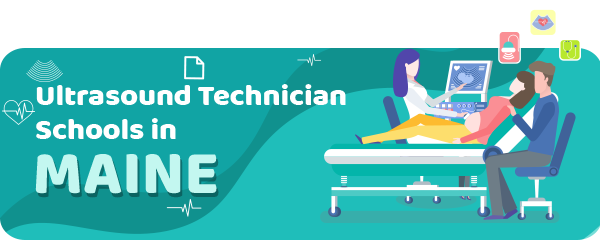To work as an ultrasound tech in Maine, you need to adhere to certain state criteria, although having a license is not mandatory according to the state’s law.
For instance, you will have to get a certification for which a training program must be completed.
Ultrasound techs use technology to take pictures of the human body, which will be then used in diagnostics.
So, how can you get a certification?
Training Requirements
Maine allows both online and in-person programs, as long as the school is approved by the Commission on Accreditation of Allied Health.
The CAAH also manages the certification exams and licenses.
To get in a program, you first need to take courses in:
- Anatomy
- Physiology
- Medical terminology
The program’s length varies depending on the degree you want to pursue.
An associate’s or bachelor’s degree has a duration of 2 to 4 years but also provides higher chances of getting a better job in the future.
If you are only after certification, you will need at least 6 months of practical experience.
The ultrasounds licenses in Maine are managed by The American Registry for Diagnostic Medical Sonography.
After finishing the training program, you will also need to pass an exam before getting your license.
| School Name | Address |
|---|---|
| Harris School of Business | 890 Main Street Suite 100 Sanford, ME 04073 |
| Kennebec Valley Community College | 92 Western Ave, Fairfield, Maine 04937 |
| Saint Joseph's College of Maine | 278 Whites Bridge Rd, Standish, ME 04084 |
| Seacoast Career Schools | 890 Main St #100, Sanford, ME 04073 |
| Southern Maine Community College | 2 Fort Rd, South Portland, ME 04106 |
As of now, the state has 2 centers where you can take the test.
The exam covers topics as sonography principles, obstetrics and gynecology, breast sonography, fetal echocardiography, neurosonology, and abdomen.
If the program you completed is not approved by the CAAHEP, you need to fulfill extra requirements.
These are as follows:
- 60 semester hours
- A year of work experience
- A mandatory internship
You can also get hired as a non-invasive cardiovascular tech through Cardiovascular Credentialing International for 24 months.
If your program is not accredited, you need to have 800 hours of practical experience to take the test.
The American Registry of Radiologic Technologists also offers certifications in breast sonography and vascular sonography after an exam.
The exam topics to get either of the above certifications are:
- Sonography procedures
- Ultrasound physical principles
- Patient care
You will need to renew this diploma every 2 years and take 24 extra education credits before renewal.
Career Opportunities in Maine
Ultrasound jobs have a good prognosis in Maine.
Until 2026, jobs are expected to increase by 17%, as reported by the Bureau of Labor Statistics in 2018.
Diagnostic medical sonography is also meant to grow by 20% until 2026, according to a report by O*Net in 2018.
The median salary for ultrasound techs in this state is $73,618 per year.
There are also several specializations in this field, allowing candidates to pursue various paths.
The type of diploma one has, along with the chosen specialization, and work experience will inevitably influence how much the person earns.
Annual Salary Range:| Location | Avg. Annual Salary |
|---|---|
| Portland | $76,418 |
| Lewiston | $75,654 |
| Bangor | $69,789 |
| South Portland | $76,418 |
| Auburn | $75,654 |
| Biddeford | $76,061 |
| Sanford | $77,263 |
| Brunswick | $75,756 |
| Scarborough | $76,418 |
| Saco | $76,265 |
Regional Salary in Maine
| Region | Employed | Avg. Annual Salary | Avg. Hourly Pay | Top 10% Annual Salary | Bottom 10% Annual Salary |
|---|---|---|---|---|---|
| Portland-South Portland, ME | 130 | $83,650 | $40.22 | $101,150 | $67,600 |
* Employment conditions in your area may vary.
As an ultrasound tech, you can work in medical facilities such as clinics or hospitals.
As the field continues growing, you can expect a long and fulfilling career after getting your license.
Read the full guide: How to Become an Ultrasound Technician
